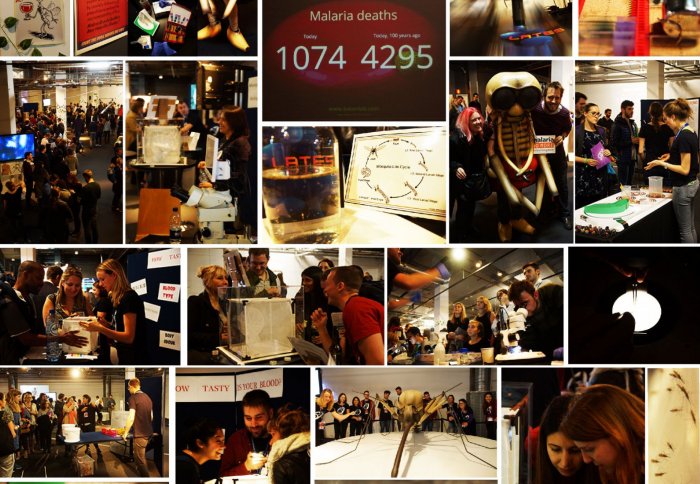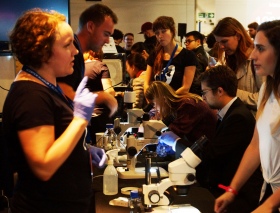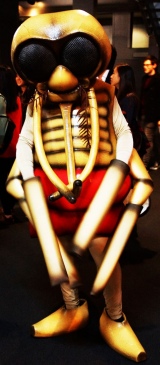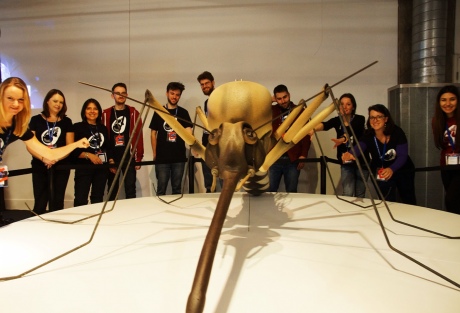DoLS @ Science Museum Lates!

Bill Gates, infectious diseases and malaria innovation at Science Museum Lates
If you happened to be walking past the Science Museum on Wednesday 26th October, you’d have noticed a queue of eager visitors snaking all the way to the end of Exhibition Road. Why? Well, last month saw collaborators from across the scientific research and development sector coming together for a very special edition of Science Museum Lates.
The event, which explored some of the biggest challenges in global health, was supported by the Bill and Melinda Gates Foundation and featured over 150 researchers and scientists showcasing exhibits around the theme of ‘Contagion’, along with a very special interview with philanthropist, Bill Gates, and musician and activist, Will.i.am, on the theme of global progress.
 The 4500 visitors to Science Museum Lates were ‘infected’ with one of a range of deadly diseases on entry, and were tasked with discovering everything they could about their disease as they explored the event. Malaria researchers from Crisanti Lab, Blagborough Lab and Baum Lab in the Department of Life Sciences, South Kensington, designed, created and exhibited an interactive Malaria Zone, which was dedicated to the investigation and fight against the mosquito-borne infectious disease.
The 4500 visitors to Science Museum Lates were ‘infected’ with one of a range of deadly diseases on entry, and were tasked with discovering everything they could about their disease as they explored the event. Malaria researchers from Crisanti Lab, Blagborough Lab and Baum Lab in the Department of Life Sciences, South Kensington, designed, created and exhibited an interactive Malaria Zone, which was dedicated to the investigation and fight against the mosquito-borne infectious disease.
The Malaria Zone proved hugely popular, with a wide range of ‘hands-on’ exhibits. Guests had the chance to:
- test their attractiveness to hungry female mosquitoes using modified mosquito cages that allowed visitors to watch the needle-like probing mouthparts as they attempted to bite
- become a master at mosquito dissections
- identify live mosquitos and recognise the blood-sucking females
- learn about how genetically modified mosquitoes could hold the key to malaria eradication
- show off their skills in ‘Parasite Pong’, throwing a drug or vaccine at the parasite to create the ultimate weapon against malaria – all using ping-pong balls, plastic cups and unlimited supplies of Haribo sweets…
- design their own malaria vaccine using sweets and learn about current vaccine efforts
- learn about how different malaria drugs kill the parasites and the rising threat of drug resistance
- screen human blood smears for malaria using light microscopy
 We were joined in the Malaria Zone by Malaria No More UK. The charity brought along their famous mascot Mozzy Man along with the GlaxoSmithKline mosquito Battack Wall, where guests could swat against the clock to test the speed of their reactions. They also told the story of malaria throughout the ages, while GlaxoSmithKline contributed an impressive giant female mosquito installation too.
We were joined in the Malaria Zone by Malaria No More UK. The charity brought along their famous mascot Mozzy Man along with the GlaxoSmithKline mosquito Battack Wall, where guests could swat against the clock to test the speed of their reactions. They also told the story of malaria throughout the ages, while GlaxoSmithKline contributed an impressive giant female mosquito installation too.
Alekos Simoni gave a talk on ‘Malaria: Past problems and future prospects’, discussing malaria eradication in Europe, advocating why additional methods are necessary in developing countries, and illustrating the new genetic gene drive technologies that could help end malaria. British explorer and Malaria No More UK Special Ambassador, Ash Dykes, rounded off the night with hair-raising tales of his adventures in Mongolia and in trekking the length of Madagascar – where he contracted a deadly strain of malaria.
With so many incredible examples of scientific innovation in the fight against malaria, no wonder the crowds were queuing around the block…
 Organisers and volunteers from the Department of Life Sciences included: Alekos Simoni, Alexander Nash, Andrea Crisanti, Anna Beber, Ann Hall, Andrew Hammond, Andrew Waters, Antonios Kriezis, Carla Siniscalchi, Claudia Wyer, Fabio Fisher, Fernando Sanchez-Roman Teran, Ioannis Kirmitzoglou, Jake Baum, Katherine Wright, Kathrin Witmer, Katja Hassler, Louise Marston, Lucy Collyns, Maria Giorgalli, Mariana reis Wunderlich, Marion Koch, Mark Wilkinson, Michal Mielcarek, Myriam Haltalli, Oliver Lyth, Olivia Swann, Roya Haghighat-Khah, Sara Zakutansky and Tom Blake.
Organisers and volunteers from the Department of Life Sciences included: Alekos Simoni, Alexander Nash, Andrea Crisanti, Anna Beber, Ann Hall, Andrew Hammond, Andrew Waters, Antonios Kriezis, Carla Siniscalchi, Claudia Wyer, Fabio Fisher, Fernando Sanchez-Roman Teran, Ioannis Kirmitzoglou, Jake Baum, Katherine Wright, Kathrin Witmer, Katja Hassler, Louise Marston, Lucy Collyns, Maria Giorgalli, Mariana reis Wunderlich, Marion Koch, Mark Wilkinson, Michal Mielcarek, Myriam Haltalli, Oliver Lyth, Olivia Swann, Roya Haghighat-Khah, Sara Zakutansky and Tom Blake.
Generously funded by the Science Museum London.
Article contributors: Holly Groom (Malaria No More), Kate Wright and Marion Koch (Baum Lab)
Photo credits: Michal Mielcarek
Article text (excluding photos or graphics) © Imperial College London.
Photos and graphics subject to third party copyright used with permission or © Imperial College London.
Reporter
Dr Roya E Haghighat-Khah
Department of Life Sciences